Fleurs du Mal Magazine


Or see the index

Tweede Podiumvlees Poetry Slam in Tilburg
Op zondagmiddag 16 maart aanstaande beleeft de nieuwe Tilburgse Poetry Slam Podiumvlees haar tweede editie. Tijdens deze Poetry Slam zullen bekende en minder bekende (slam)dichters in drie rondes de poëtische strijd met elkaar aangaan. Op het spel staat een plaats in de Tilburgse Stedelijke Finale, die in september 2014 tijdens het Incubate-Festival gehouden wordt. De Poetry Slam vindt op zondag 16 maart plaats in de Hall of Fame. Aanvang 15.00u, toegang is gratis.
In deze editie van Podiumvlees gaan onder anderen Gerard Scharn, Jolies Heij en Jonathan Griffioen de strijd met elkaar aan om een plaats in de Stedelijke Finale met elkaar aan. Zij worden beoordeeld door zowel een vakjury als een publieksjury. De vakjury bestaat uit dichter Daan Doesborgh en dichter Martin Beversluis.
Podiumvlees is een initiatief van de Tilburgse slamdichters Martin Beversluis en Daan Taks. Zij organiseren komend seizoen vier voorrondes en een Stedelijke Finale van Podiumvlees. De winnaar van de Stedelijke Finale wint een ticket voor het Nederlands Kampioenschap Poetry Slam 2015 in Utrecht. Daarnaast maakt Uitgeverij teleXpress een verzamelbundel met daarin werk van alle dichters en dichteressen die dit seizoen meedoen aan Podiumvlees. Deze verzamelbundel wordt tijdens de Stedelijke Finale gepresenteerd.

Podiumvlees is altijd op zoek naar nieuwe deelnemers. Wie meer informatie wil, kan op facebook terecht: www.facebook.com/podiumvlees
fleursdumal.nl magazine for art & literature
More in: Art & Literature News, Beversluis, Martin, Poetry Slam
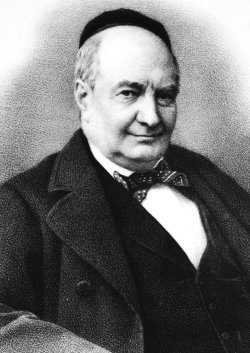
Charles Sainte-Beuve
(1804-1869)
Les rayons jaunes
Les dimanches d’été, le soir, vers les six heures,
Quand le peuple empressé déserte ses demeures
Et va s’ébattre aux champs,
Ma persienne fermée, assis à ma fenêtre,
Je regarde d’en haut passer et disparaître
Joyeux bourgeois, marchands,
Ouvriers en habits de fête, au coeur plein d’aise ;
Un livre est entr’ouvert près de moi, sur ma chaise :
Je lis ou fais semblant ;
Et les jaunes rayons que le couchant ramène,
Plus jaunes ce soir-là que pendant la semaine,
Teignent mon rideau blanc.
J’aime à les voir percer vitres et jalousie ;
Chaque oblique sillon trace à ma fantaisie
Un flot d’atomes d’or ;
Puis, m’arrivant dans l’âme à travers la prunelle,
Ils redorent aussi mille pensers en elle,
Mille atomes encor.
Ce sont des jours confus dont reparaît la trame,
Des souvenirs d’enfance, aussi doux à notre âme
Qu’un rêve d’avenir :
C’était à pareille heure (oh ! je me le rappelle)
Qu’après vêpres, enfants, au choeur de la chapelle,
On nous faisait venir.
La lampe brûlait jaune, et jaune aussi les cierges ;
Et la lueur glissant aux fronts voilés des vierges
Jaunissait leur blancheur ;
Et le prêtre vêtu de son étole blanche
Courbait un front jauni, comme un épi qui penche
Sous la faux du faucheur.
Oh ! qui dans une église à genoux sur la pierre,
N’a bien souvent, le soir, déposé sa prière,
Comme un grain pur de sel ?
Qui n’a du crucifix baisé le jaune ivoire ?
Qui n’a de l’Homme-Dieu lu la sublime histoire
Dans un jaune missel ?
Mais où la retrouver, quand elle s’est perdue,
Cette humble foi du coeur, qu’un ange a suspendue
En palme à nos berceaux ;
Qu’une mère a nourrie en nous d’un zèle immense ;
Dont chaque jour un prêtre arrosait la semence
Aux bords des saints ruisseaux ?
Peut-elle refleurir lorsqu’a soufflé l’orage,
Et qu’en nos coeurs l’orgueil debout, a dans sa rage
Mis le pied sur l’autel ?
On est bien faible alors, quand le malheur arrive
Et la mort… faut-il donc que l’idée en survive
Au voeu d’être immortel !
J’ai vu mourir, hélas ! ma bonne vieille tante,
L’an dernier ; sur son lit, sans voix et haletante,
Elle resta trois jours,
Et trépassa. J’étais près d’elle dans l’alcôve ;
J’étais près d’elle encor, quand sur sa tête chauve
Le linceul fit trois tours.
Le cercueil arriva, qu’on mesura de l’aune ;
J’étais là… puis, autour, des cierges brûlaient jaune,
Des prêtres priaient bas;
Mais en vain je voulais dire l’hymne dernière ;
Mon oeil était sans larme et ma voix sans prière,
Car je ne croyais pas.
Elle m’aimait pourtant… ; et ma mère aussi m’aime,
Et ma mère à son tour mourra ; bientôt moi-même
Dans le jaune linceul
Je l’ensevelirai ; je clouerai sous la lame
Ce corps flétri, mais cher, ce reste de mon âme ;
Alors je serai seul ;
Seul, sans mère, sans soeur, sans frère et sans épouse ;
Car qui voudrait m’aimer, et quelle main jalouse
S’unirait à ma main ?…
Mais déjà le soleil recule devant l’ombre,
Et les rayons qu’il lance à mon rideau plus sombre
S’éteignent en chemin…
Non, jamais à mon nom ma jeune fiancée
Ne rougira d’amour, rêvant dans sa pensée
Au jeune époux absent ;
Jamais deux enfants purs, deux anges de promesse
Ne tiendront suspendu sur moi, durant la messe,
Le poêle jaunissant.
Non, jamais, quand la mort m’étendra sur ma couche,
Mon front ne sentira le baiser d’une bouche,
Ni mon oeil obscurci
N’entreverra l’adieu d’une lèvre mi-close !
Jamais sur mon tombeau ne jaunira la rose,
Ni le jaune souci !
Ainsi va ma pensée, et la nuit est venue ;
Je descends, et bientôt dans la foule inconnue
J’ai noyé mon chagrin :
Plus d’un bras me coudoie ; on entre à la guinguette,
On sort du cabaret ; l’invalide en goguette
Chevrotte un gai refrain.
Ce ne sont que chansons, clameurs, rixes d’ivrogne,
Ou qu’amours en plein air, et baisers sans vergogne,
Et publiques faveurs ;
Je rentre : sur ma route on se presse, on se rue ;
Toute la nuit j’entends se traîner dans ma rue
Et hurler les buveurs.
Charles Sainte-Beuve poetry
fleursdumal.nl magazine
More in: Archive S-T, CLASSIC POETRY
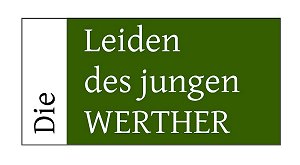
The Sorrows of Young Werther (18)
by J.W. von Goethe
JULY 11.
Madame M–is very ill. I pray for her recovery, because Charlotte shares my sufferings. I see her occasionally at my friend’s house, and to-day she has told me the strangest circumstance. Old M–is a covetous, miserly fellow, who has long worried and annoyed the poor lady sadly; but she has borne her afflictions patiently. A few days ago, when the physician informed us that her recovery was hopeless, she sent for her husband (Charlotte was present), and addressed him thus: “I have something to confess, which, after my decease, may occasion trouble and confusion. I have hitherto conducted your household as frugally and economically as possible, but you must pardon me for having defrauded you for thirty years. At the commencement of our married life, you allowed a small sum for the wants of the kitchen, and the other household expenses. When our establishment increased and our property grew larger, I could not persuade you to increase the weekly allowance in proportion: in short, you know, that, when our wants were greatest, you required me to supply everything with seven florins a week. I took the money from you without an observation, but made up the weekly deficiency from the money-chest; as nobody would suspect your wife of robbing the household bank. But I have wasted nothing, and should have been content to meet my eternal Judge without this confession, if she, upon whom the management of your establishment will devolve after my decease, would be free from embarrassment upon your insisting that the allowance made to me, your former wife, was sufficient.”
I talked with Charlotte of the inconceivable manner in which men allow themselves to be blinded; how any one could avoid suspecting some deception, when seven florins only were allowed to defray expenses twice as great. But I have myself known people who believed, without any visible astonishment, that their house possessed the prophet’s never-failing cruse of oil.
The Sorrows of Young Werther (Die Leiden des jungen Werther) by J.W. von Goethe. Translated by R.D. Boylan.
To be continued
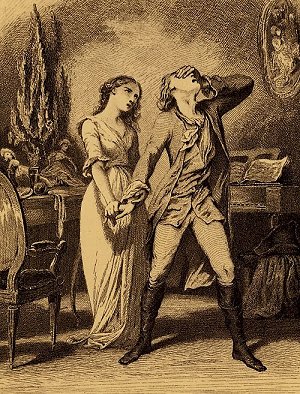
fleursdumal.nl magazine for art & literature
More in: -Die Leiden des jungen Werther, Goethe, Johann Wolfgang von
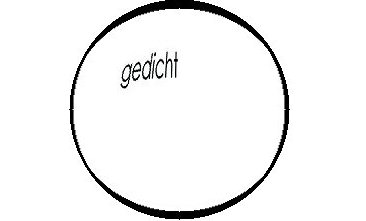
NRC Handelsblad neemt het niet zo nauw met het laatste gedicht van Leo Vroman (1915-2014)
In de NRC van 1 maart 2014 (blz 12) stond het laatste gedicht dat Leo Vroman voor zijn overlijden schreef. NRC Handelsblad drukte het gedicht foutief af. Het eerste woord van de laatste regel stond gedrukt als laatste woord van de voorafgaande regel, waardoor het rijmpaar verdwenen was.
Cornelis W. Schoneveld, oud-docent historische Engelse letterkunde en vertaalwetenschapper aan de Universiteit van Leiden èn medewerker aan fleursdumal.nl, attendeerde de redactie van NRC op de vergissing.
EINDE
Hij lijkt vast minder erg –
die lief bijeengebrachte
hoop spaanders van mijn gedachten –
op mij dan op een berg.
Waar zal die laaiende gestalte
van mij dan uit bestaan
en waar kwam die al te
late eerste vonk vandaan?
Versie NRC
(. . .)
Waar zal die laaiende gestalte
van mij dan uit bestaan
en waar kwam die al te late
eerste vonk vandaan?
De redactie van NRC liet Cornelis Schoneveld weten het niet de moeite waard te vinden om actie te ondernemen op zijn verzoek om de tekst te corrigeren.
Het is ook maar een gedicht natuurlijk.
fleursdumal.nl magazine
More in: Archive U-V, POETRY IN TRANSLATION: SCHONEVELD, The talk of the town, Vroman, Leo

Blauwe hemel
nieuwe dichtbundel van Kreek Daey Ouwens
door Carina van der Walt
Op Nationale Gedichtendag 2014 is de nieuwe dichtbundel van Kreek Daey Ouwens geïntroduceerd in Café De Nieuwe Liefde in Amsterdam. Blauwe hemel is in alle opzichten een goedverzorgde bundel – van de subtiele schakeringen van blauw en de illustratie op de omslag tot bij de laatste poëtische tekst op pagina 79:
Overjarige citroenen zijn bitter.
Je moet ze dezelfde dag nog eten.
Bij de eerste hap trekt je mond
zich samen. Alsof je in ijs bijt.
Maar je tong went eraan.
Met deze laatste tekst eindigt de beschrijving van het “overjarige” huwelijk van de hoofdpersoon, meneer Danie. De beschrijving van citroenen begint op p.9 in het eerste van de vijftien delen, waaruit de bundel is opgebouwd:
Ik koop citroenen, die zwaar zijn als ijzer.
Het perspectief is van meneer Danie. Alle “gedichten” zijn zonder titels. Ze zijn als kralen aan elkaar gesnoerd om samen één verhaal van een beknellend ongelukkig huwelijk te vertellen. Meneer Danie leeft samen met mevrouw Danie en hun magere kat, maar hij is verliefd op de kassière Larissa. Met zijn verliefdheid doet hij niks, behalve voortdurend aan Larissa te denken, in zijn gedachten met haar gesprekken te voeren en acht brieven aan haar te schrijven die allemaal beginnen met “Mijn Larissa”. Voor zijn pragmatische en even vereenzaamde vrouw voelt hij weinig. Zijn gevoelens van zwaarmoedigheid, angst en wanhoop worden overgedragen met alledaagse metaforen. Anemonen, angstdromen, een zilveren lepel en het dwangmatige tellen van strepen zijn pogingen om zijn ongelukkige leven voor zichzelf dragelijker te maken. Om een beetje houvast te krijgen.
Typografisch is de bundel zeer sober. Er zijn veel witte ruimtes op de pagina’s. Deze witte ruimtes compenseren de loodzware emoties die zich verschuilen achter alledaagse objecten of handelingen. Daey Ouwens’ taalgebruik is fijnzinnig. Haar observaties zijn treffend en dikwijls onontkoombaar. Om een indruk te geven van de constructie van Blauwe hemel volgt hier een van de kortste afdelingen.
Liefde
Opnieuw een angstige droom. Ik werd
zwetend wakker. Hoewel het nog nacht
was, tekende zicht achter de ramen een
doods, wit licht af. Ik ging mijn bed
uit. Ik bekeek mezelf in de spiegel.
Met stukjes en beetjes probeerde ik
mijn droom te duiden. Ik herinnerde
mij alleen dat die onbegrijpelijk en
beangstigend was. Ook mijn eigen ge-
zicht kwam mij vreemd en bang voor.
Ik sloot mijn ogen. Mijn gezicht bleef
me aanstaren. In een uiterste poging
het uit mijn hoofd te bannen, probeerde
ik de latten van de luxaflex te tellen.
Dat viel niet mee. Ik moest telkens op-
nieuw beginnen.
Gisteren woonde ik de uitvaart bij van
een verre neef. Iedereen wierp wat aarde
op de kist. De weduwe het eerst. Er ging
een schok door me heen, Larissa, zoveel
als ze op u leek! De buiging van haar
nek. Maar ik schrok ook, omdat ik zag
dat ze niet van hem hield. Dat je niet
van iemand houdt, is begrijpelijk. Niet
meer dan een fout. En zoals bij elke
fout kan ik er niet achter komen of een
mens het misschien zelf zo wil. Als dat
zo is, is je verstand er niet tegen op-
gewassen.
Het is opnieuw zeer koud. Bent u warm genoeg
gekleed? Dat winkelschort stelt toch niet
veel voor. En het tocht behoorlijk in die
hoek bij de kassa. Zorg goed voor u zelf,
Larissa. Ik kan niet voor u zorgen.
De Vlaamse gewoonte om de geliefde met “u” aan te spreken herinnert me aan de even zwaarmoedige debuutbundel van de Vlaming, Charles Ducal. Het huwelijk (1987) is een beklemmend relaas over het huwelijksleven. Ducal en Daey Ouwens delen een bijzondere manier van kijken. In de bundel van Daey Ouwens ligt elke tekst als een parel op precies de juiste plaatst. Je wenst het je ergste vijanden niet toe, maar bij lezing slaat regelmatig de ontluistering toe als de herkenbaarheid je in het gezicht staart.
CARINA VAN DER WALT
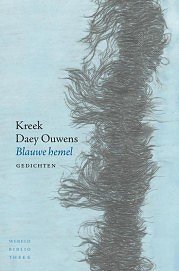
Kreek Daey Ouwens (Lindenheuvel, 1942) debuteerde in 1991 met Stokkevingers, een bundel verhalen en gedichten. In 1995 verscheen Tegen de kippen en de haan, in 2004 Kinderbed en in 2009 De achterkant, dat genomineerd werd voor de VSB Poëzieprijs 2009-2010.
Kreek Daey Ouwens: Blauwe hemel – Uitgever: Wereldbibliotheek 2014 – ISBN: 9789028425668 – Prijs: € 19,90 – 80 blz.
fleursdumal.nl magazine for art & literature
More in: - Book News, Archive O-P, Art & Literature News, Ouwens, Kreek Daey, Walt, Carina van der

The Sorrows of Young Werther (17)
by J.W. von Goethe
JULY 8.
What a child is man that he should be so solicitous about a look! What a child is man! We had been to Walheim: the ladies went in a carriage; but during our walk I thought I saw in Charlotte’s dark eyes–I am a fool–but forgive me! you should see them,–those eyes.–However, to be brief (for my own eyes are weighed down with sleep), you must know, when the ladies stepped into their carriage again, young W. Seldstadt, Andran, and I were standing about the door. They are a merry set of fellows, and they were all laughing and joking together. I watched Charlotte’s eyes. They wandered from one to the other; but they did not light on me, on me, who stood there motionless, and who saw nothing but her! My heart bade her a thousand times adieu, but she noticed me not.
The carriage drove off; and my eyes filled with tears. I looked after her: suddenly I saw Charlotte’s bonnet leaning out of the window, and she turned to look back, was it at me? My dear friend, I know not; and in this uncertainty I find consolation. Perhaps she turned to look at me. Perhaps! Good-night–what a child I am!
JULY 10.
You should see how foolish I look in company when her name is mentioned, particularly when I am asked plainly how I like her. How I like her!
I detest the phrase. What sort of creature must he be who merely liked Charlotte, whose whole heart and senses were not entirely absorbed by her. Like her! Some one asked me lately how I liked Ossian.
The Sorrows of Young Werther (Die Leiden des jungen Werther) by J.W. von Goethe. Translated by R.D. Boylan.
To be continued
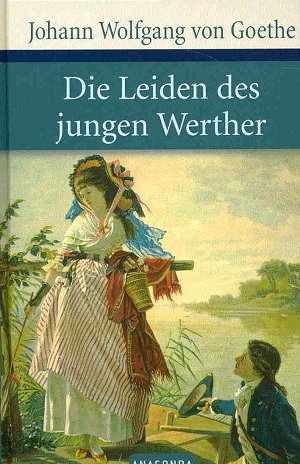
fleursdumal.nl magazine for art & literature
More in: -Die Leiden des jungen Werther, Goethe, Johann Wolfgang von
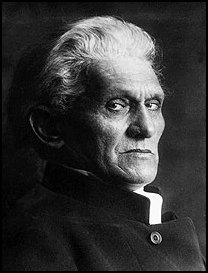
Stefan Georg
(1868-1933)
STRAND
O lenken wir hinweg von wellenauen!
Die wenn auch wild im wollen und mit düsterm rollen
Nur dulden scheuer möwen schwingenschlag
Und stet des keuschen himmels farben schauen.
Wir heuchelten zu lang schon vor dem tag.
Zu weihern grün mit moor und blumenspuren
Wo gras und laub und ranken wirr und üppig schwanken
Und ewger abend einen altar weiht!
Die schwäne die da aus der buchtung fuhren ·
Geheimnisreich · sind unser brautgeleit.
Die lust entführt uns aus dem fahlen norden:
Wo deine lippen glühen fremde kelche blühen –
Und fliesst dein leib dahin wie blütenschnee
Dann rauschen alle stauden in akkorden
Und werden lorbeer tee und aloe.
Stefan Georg poetry
fleursdumal.nl magazine
More in: Archive G-H, George, Stefan
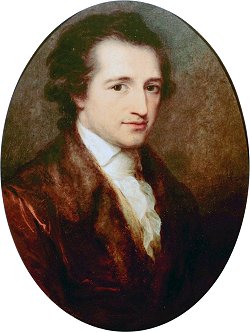
Johann Wolfgang von Goethe
(1749-1832)
Liebhaber in allen Gestalten
Ich wollt, ich wär ein Fisch,
So hurtig und frisch;
Und kämst du zu anglen,
Ich würde nicht manglen.
Ich wollt, ich wär ein Fisch,
So hurtig und frisch.
Ich wollt, ich wär ein Pferd,
Da wär ich dir wert.
O wär ich ein Wagen,
Bequem dich zu tragen.
Ich wollt, ich wär ein Pferd,
Da wär ich dir wert.
Ich wollt, ich wäre Gold,
Dir immer im Sold;
Und tätst du was kaufen,
Käm ich wieder gelaufen.
Ich wollt, ich wäre Gold,
Dir immer im Sold.
Ich wollt, ich wär treu,
Mein Liebchen stets neu;
Ich wollt mich verheißen,
Wollt nimmer verreisen.
Ich wollt, ich wär treu,
Mein Liebchen stets neu.
Ich wollt, ich wär alt
Und runzlig und kalt;
Tätst du mir’s versagen,
Da könnt mich’s nicht plagen.
Ich wollt, ich wär alt
Und runzlig und kalt.
Wär ich Affe sogleich,
Voll neckender Streich’;
Hätt was dich verdrossen,
So macht ich dir Possen.
Wär ich Affe sogleich,
Voll neckender Streich’.
Wär ich gut wie ein Schaf,
Wie der Löwe so brav;
Hätt Augen wie’s Lüchschen
Und Listen wie’s Füchschen.
Wär ich gut wie ein Schaf,
Wie der Löwe so brav.
Was alles ich wär,
Das gönnt ich dir sehr;
Mit fürstlichen Gaben,
Du solltest mich haben.
Was alles ich wär,
Das gönnt ich dir sehr.
Doch bin ich, wie ich bin,
Und nimm mich nur hin!
Willst du beßre besitzen,
So laß dir sie schnitzen.
Ich bin nun, wie ich bin;
So nimm mich nur hin!
Goethe poetry
fleursdumal.nl magazine
More in: Archive G-H, Goethe, Johann Wolfgang von
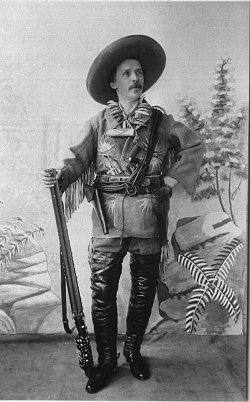
Karl May
(1842-1912)
Trost
Horch, klopfte es nicht an die Pforte?
Wer naht, von Himmelsduft umrauscht?
Woher des Trostes süße Worte,
Auf die mein Herz voll Andacht lauscht?
Wer neigt, wenn alle Sterne sanken,
Mit mildem Licht und stiller Huld
Sich zu dem Staub- und Erdenkranken?
Es ist der Engel der Geduld.
»O laß den Gram nicht mächtig werden,
Du tiefbetrübtes Menschenkind!
Wiß’, daß die Leiden dieser Erden
Des Himmels beste Gaben sind
Und daß, wenn Sorgen Dich umwogen
Und Dich umhüllt des Zweifels Nacht,
Dort an dem glanzumfloss’nen Bogen
Ein treues Vaterauge wacht!«
»O laß Dir nicht zu Herzen steigen
Die langverhaltne Thränenfluth!
Wiß, daß grad in den schmerzensreichen
Geschicken tiefe Weisheit ruht,
Und daß, wenn sonst Dir Nichts verbliebe,
Die Hoffnung doch Dir immer lacht,
Da über Dich in ew’ger Liebe
Ein treues Vaterauge wacht!«
»O wolle nie Dich einsam fühlen!
Obgleich kein Aug’ sie wandeln sah,
Die sorgenheiße Stirn zu kühlen
Sind Himmelsboten immer da.
Wer gern dem eignen Herzen glaubte,
Der kennt des Pulses heilige Macht.
Drum wiß, das über Deinem Haupte
Ein treues Vaterauge wacht!«
»Drum füge Dich in Gottes Walten
Und trag Dein Leid getrost und still.
Es muß im Dunkel sich gestalten,
Was er zum Lichte führen will.
Dann bringt der Glaube reichen Segen,
Ob ihn der Zweifler auch verlacht,
Daß über allen Deinen Wegen
Ein treues Vaterauge wacht!«
Karl May poetry
fleursdumal.nl magazine
More in: Archive M-N, Karl May

The Sorrows of Young Werther (16)
by J.W. von Goethe
JULY 6.
She is still with her dying friend, and is still the same bright, beautiful creature whose presence softens pain, and sheds happiness around whichever way she turns. She went out yesterday with her little sisters: I knew it, and went to meet them; and we walked together. In about an hour and a half we returned to the town. We stopped at the spring I am so fond of, and which is now a thousand times dearer to me than ever. Charlotte seated herself upon the low wall, and we gathered about her. I looked around, and recalled the time when my heart was unoccupied and free. “Dear fountain!” I said, “since that time I have no more come to enjoy cool repose by thy fresh stream: I have passed thee with careless steps, and scarcely bestowed a glance upon thee.” I looked down, and observed Charlotte’s little sister, Jane, coming up the steps with a glass of water. I turned toward Charlotte, and I felt her influence over me. Jane at the moment approached with the glass. Her sister, Marianne, wished to take it from her. “No!” cried the child, with the sweetest expression of face, “Charlotte must drink first.”
The affection and simplicity with which this was uttered so charmed me, that I sought to express my feelings by catching up the child and kissing her heartily. She was frightened, and began to cry. “You should not do that,” said Charlotte: I felt perplexed. “Come, Jane,” she continued, taking her hand, and leading her down the steps again, “it is no matter: wash yourself quickly in the fresh water.” I stood and watched them; and when I saw the little dear rubbing her cheeks with her wet hands, in full belief that all the impurities contracted from my ugly beard would be washed off by the miraculous water, and how, though Charlotte said it would do, she continued still to wash with all her might, as though she thought too much were better than too little, I assure you, Wilhelm, I never attended a baptism with greater reverence; and, when Charlotte came up from the well, I could have prostrated myself as before the prophet of an Eastern nation.
In the evening I would not resist telling the story to a person who, I thought, possessed some natural feeling, because he was a man of understanding. But what a mistake I made. He maintained it was very wrong of Charlotte, that we should not deceive children, that such things occasioned countless mistakes and superstitions, from which we were bound to protect the young. It occurred to me then, that this very man had been baptised only a week before; so I said nothing further, but maintained the justice of my own convictions. We should deal with children as God deals with us, we are happiest under the influence of innocent delusions.
The Sorrows of Young Werther (Die Leiden des jungen Werther) by J.W. von Goethe. Translated by R.D. Boylan.
To be continued
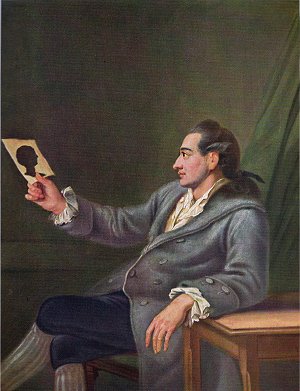
fleursdumal.nl magazine
More in: -Die Leiden des jungen Werther, Goethe, Johann Wolfgang von
Kate Tempest: Brand New Ancients On Film – Part 2
In association with the Brand New Ancients tour, Battersea Arts Centre in collaboration with director Joe Roberts, has produced three short films interpreting Kate Tempest’s spoken word through moving image.
Kate Tempest started out when she was 16, rapping at strangers on night busses and pestering mc’s to let her on the mic at raves. Ten years later she is a published playwright, poet and respected recording artist.
fleursdumal.nl magazine
More in: Archive S-T, Art & Literature News, AUDIO, CINEMA, RADIO & TV, Kate/Kae Tempest, Tempest, Kate/Kae

IJzerhard
Stalen glans op paars blad. Op hoge stelen wiegt
de ijzerhard. Middaguur in onze hortus botanicus
liegt niet: het land van gisteren is toe. Alles bloeit.
Ik hoor kinderen op een nabijgelegen schoolplein
driewerf hoera roepen. Er wordt traag gesproeid
door een man die graag bezorgd lijkt. Soms wil hij
de tuin uit hollen en het op een gillen zetten, maar
zijn bladeren houden niet van geluid. Het ruikt naar
zoethout. Een koolwitje laveert tegen wind in, en zand
wijkt zachtjes voor zaad. Wolkjes zijn licht en de goden
nabij. Laat alle mensen maar weten waar de verhalen
over gaan. Wie een grens trekt heeft een huis.
Bert Bevers
verschenen in Eigen terrein – Gedichten 1998-2013, Uitgeverij WEL, Bergen op Zoom, 2013
fleursdumal.nl magazine
More in: Archive A-B, Bevers, Bert
Thank you for reading Fleurs du Mal - magazine for art & literature